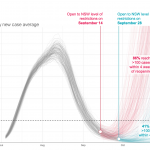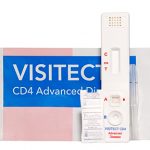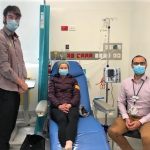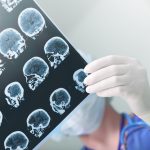The COVID-19 response continues based on sound modelling and important clinical trials; WHO endorses a rapid, point-of-care diagnostic for HIV; world-first cancer trials commence; machine learning is harnessed to fast-track early diagnosis of epilepsy; we learn more about why repeated head hits are bad news; and Alliance leaders are recognised as finalists in the prestigious Eureka Prizes. Here’s just some of what has happened this week at the Alfred Research Alliance.
BURNET INSTITUTE
Burnet modelling informs Victoria’s COVID roadmap
 Burnet Institute COVASIM modelling warning of the risks of opening up too quickly has helped to inform the latest reshaping of COVID-19 restrictions by the Victorian Government. Burnet researchers led by Dr Nick Scott modelled what would happen under different scenarios, finding that opening too quickly would result in a 41 percent chance of a third wave of COVID-19 infections within four weeks. The Victorian government accepted a number of Burnet’s key recommendations, including the adoption of ‘trigger points’ rather than dates, to define the next steps out of lockdown. Read more…
Burnet Institute COVASIM modelling warning of the risks of opening up too quickly has helped to inform the latest reshaping of COVID-19 restrictions by the Victorian Government. Burnet researchers led by Dr Nick Scott modelled what would happen under different scenarios, finding that opening too quickly would result in a 41 percent chance of a third wave of COVID-19 infections within four weeks. The Victorian government accepted a number of Burnet’s key recommendations, including the adoption of ‘trigger points’ rather than dates, to define the next steps out of lockdown. Read more…
World Health Organisation endorses Burnet’s HIV diagnostic
 The Burnet-designed VISITECT® CD4 Advanced Disease Test, a rapid point-of-care test for HIV, has been accepted for the WHO’s list of prequalified in vitro diagnostics, after auditors found it effective at measuring a patient’s CD4 T cell count to assess whether urgent interventions are required in patients diagnosed with advanced HIV. Burnet Deputy Director, A/Prof David Anderson said the listing of the low-cost, portable test will allow agencies delivering HIV services in low-to-middle income countries to put more people onto the appropriate HIV treatment sooner. Read more…
The Burnet-designed VISITECT® CD4 Advanced Disease Test, a rapid point-of-care test for HIV, has been accepted for the WHO’s list of prequalified in vitro diagnostics, after auditors found it effective at measuring a patient’s CD4 T cell count to assess whether urgent interventions are required in patients diagnosed with advanced HIV. Burnet Deputy Director, A/Prof David Anderson said the listing of the low-cost, portable test will allow agencies delivering HIV services in low-to-middle income countries to put more people onto the appropriate HIV treatment sooner. Read more…
Refugees at serious risk from COVID-19
 The impact of the COVID-19 pandemic on refugees and internally displaced and stateless people is highlighted in new Burnet Institute research showing these vulnerable populations are at serious risk. According to Burnet’s latest COVID-19 Global Trends and Analyses report, more than 70 million people worldwide have fled their homes due to conflict and unrest, with up to 10 million living in refugee camps and informal settlements. The report was compiled by Scott Umali, Prof Mike Toole AM, Dr Suman Majumdar, and Dr Ben Coghlan. Read more…
The impact of the COVID-19 pandemic on refugees and internally displaced and stateless people is highlighted in new Burnet Institute research showing these vulnerable populations are at serious risk. According to Burnet’s latest COVID-19 Global Trends and Analyses report, more than 70 million people worldwide have fled their homes due to conflict and unrest, with up to 10 million living in refugee camps and informal settlements. The report was compiled by Scott Umali, Prof Mike Toole AM, Dr Suman Majumdar, and Dr Ben Coghlan. Read more…
360biolabs
Clinical trial boom for Victorian biotech firms
 Comparatively low COVID-19 infection rates have attracted global biotech companies to Victoria to conduct clinical trials, causing a boom for the state’s sector with local biotech firms being flooded with work from overseas clients. 360biolabs Executive Vice President, Angela Luttick, said it was a “no-brainer” for overseas biotech companies to conduct clinical trials in Victoria, with low levels of COVID positivity, a fast regulatory environment, and R&D tax incentives. Read more…
Comparatively low COVID-19 infection rates have attracted global biotech companies to Victoria to conduct clinical trials, causing a boom for the state’s sector with local biotech firms being flooded with work from overseas clients. 360biolabs Executive Vice President, Angela Luttick, said it was a “no-brainer” for overseas biotech companies to conduct clinical trials in Victoria, with low levels of COVID positivity, a fast regulatory environment, and R&D tax incentives. Read more…
ALFRED HEALTH
First-in-world cancer trials commence at The Alfred
 Alfred Cancer Trials (ACT) has begun testing two new Phase 1 cancer drugs, treating the first patients in the world on these trials. These first-in-human drug trials for advanced cancers are currently at the safety testing stage, to determine the best dose for patients. The Alfred has been selected as one of only a few sites permitted to run these Phase 1 cancer trials. ACT has been conducting first-in-human drug trials since 2019 and will have 16 early phase trials open to recruitment by the end of October 2020. Read more…
Alfred Cancer Trials (ACT) has begun testing two new Phase 1 cancer drugs, treating the first patients in the world on these trials. These first-in-human drug trials for advanced cancers are currently at the safety testing stage, to determine the best dose for patients. The Alfred has been selected as one of only a few sites permitted to run these Phase 1 cancer trials. ACT has been conducting first-in-human drug trials since 2019 and will have 16 early phase trials open to recruitment by the end of October 2020. Read more…
MONASH CENTRAL CLINICAL SCHOOL
Epilepsy diagnosis fast-tracked with machine learning technology
 Researchers at Monash University have applied advanced machine learning technology to provide epilepsy patients with a more accurate and rapid diagnosis. Epilepsy Research Fellow and PhD candidate Mubeen Janmohamed from the Kwan Group at Monash CCS and fellow project researcher and PhD Candidate Duong Nhu from the Monash Faculty of IT used two large datasets of routine EEG recordings made available through collaboration with Alfred Health and The Royal Melbourne Hospital, to model the machine learning algorithm. Read more…
Researchers at Monash University have applied advanced machine learning technology to provide epilepsy patients with a more accurate and rapid diagnosis. Epilepsy Research Fellow and PhD candidate Mubeen Janmohamed from the Kwan Group at Monash CCS and fellow project researcher and PhD Candidate Duong Nhu from the Monash Faculty of IT used two large datasets of routine EEG recordings made available through collaboration with Alfred Health and The Royal Melbourne Hospital, to model the machine learning algorithm. Read more…
Why repeated head hits are bad for you
 Prof Meng Law, Professor of Radiology at Monash University’s Department of Neuroscience and Director of Radiology and Nuclear Medicine at Alfred Health, has released a video on YouTube that explains chronic traumatic encephelopathy (CTE). He explains that repeated head hits, such as those happening to players in contact sports, can cause CTE – that is, bleeding, bruising and atrophy (shrinking) of the brain – causing a range of neurological symptoms. Watch the video…
Prof Meng Law, Professor of Radiology at Monash University’s Department of Neuroscience and Director of Radiology and Nuclear Medicine at Alfred Health, has released a video on YouTube that explains chronic traumatic encephelopathy (CTE). He explains that repeated head hits, such as those happening to players in contact sports, can cause CTE – that is, bleeding, bruising and atrophy (shrinking) of the brain – causing a range of neurological symptoms. Watch the video…
Gemma Sharp named Eureka Prize finalist for promoting understanding of science
 Dr Gemma Sharp, NHRMC Early Career Senior Research Fellow in the Monash CCS Department of Psychiatry, is a finalist in the prestigious Australian Museum Eureka Prizes 2020 Celestino Eureka Prize for Promoting Understanding of Science. Known for her ability to tackle stigmatised and misunderstood issues, including body dysmorphia and eating disorders, Dr Sharp is a skilled science communicator who extends her influence across multiple media platforms and has contributed to greater mental health awareness and treatment seeking in the community. Read more…
Dr Gemma Sharp, NHRMC Early Career Senior Research Fellow in the Monash CCS Department of Psychiatry, is a finalist in the prestigious Australian Museum Eureka Prizes 2020 Celestino Eureka Prize for Promoting Understanding of Science. Known for her ability to tackle stigmatised and misunderstood issues, including body dysmorphia and eating disorders, Dr Sharp is a skilled science communicator who extends her influence across multiple media platforms and has contributed to greater mental health awareness and treatment seeking in the community. Read more…
MONASH PUBLIC HEALTH & PREVENTIVE MEDICINE
Professor Allen Cheng among Eureka Prize finalists

Infectious disease researcher Prof Allen Cheng is among those who have been named finalist in the country’s most prestigious science awards – the Australian Museum Eureka Prizes – in the Australian Infectious Diseases Research Centre Eureka Prize for Infectious Diseases Research category. The announcement, made last week, recognises Prof Cheng’s work with the Australian Paediatric Influenza Immunisation Research Group which has contributed to a dramatic increase in the number of children vaccinated against flu – from just 80,000 in 2017 to an estimated 1 million in 2020. Read more…
